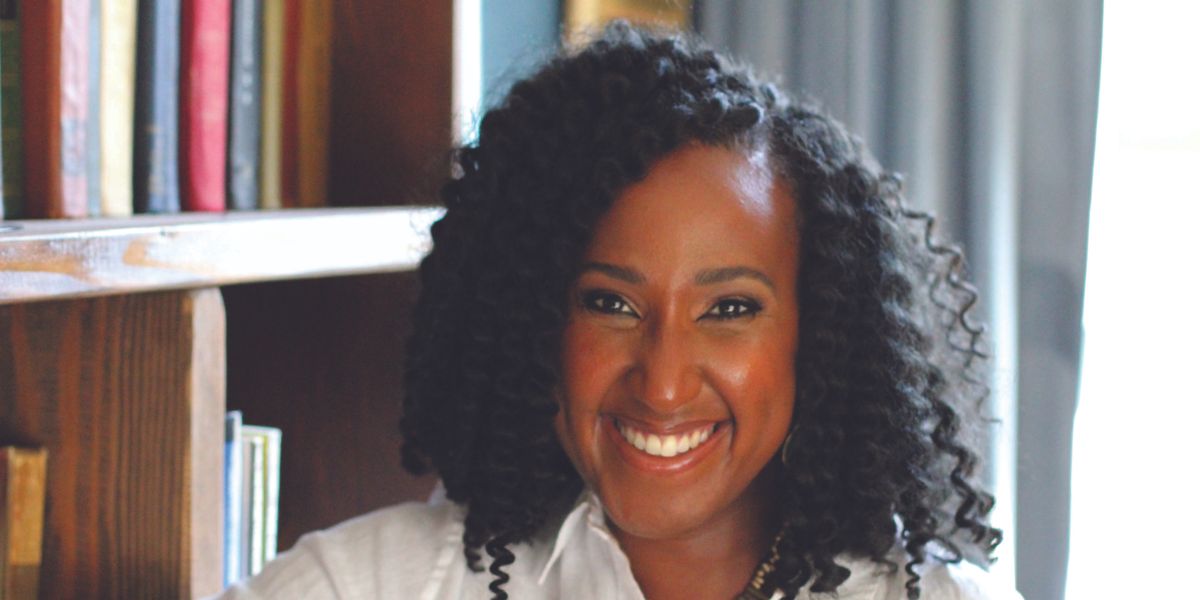
Jayne Allen Says 'Black Girls Must Have It All' Is A Love Letter To Black Women
From its lush cover featuring a dark-skinned Black woman with natural hair, down to its title, when readers pick up a copy of Black Girls Must Have It All, it's unapologetic in who the intended audience is. Author Jayne Allen has delivered a series, starting with Black Girls Must Die Exhausted, that is written for Black women, about Black women, by a Black woman.
Over the course of three books, Allen navigates the complexities of race and relationships in corporate America, the realities of Black maternal health, and the dynamics of love and partnerships, and she wraps it in a story built around sisterhood and family.
In this latest release, readers, along with the main protagonist, Tabitha Walker, are forced to reexamine what it means to “have it all” and question the life society has ingrained in us as acceptable.
xoNecole spoke to author Jayne Allen about Black Girls Must Have it All, her trilogy that has sparked debates, side-eyes, and “Girl….no he didn’t” moments and has inspired conversations and laughs for book clubs and readers across the world.

Courtesy of Jayne Allen
xoNecole: Let’s start at the beginning. Walk us through how Tabitha and her story 'Black Girls Must Die Exhausted' was formed.
Jayne Allen: I wrote this book by necessity. I came up with the idea around 2016, and that was a very vitriolic environment for Black and brown people, and combining that with being a Black woman, I just felt this weight.
It made me take a look at my life and what I was carrying with no sweat. This is a story about the day-to-day of navigating these layers of challenges and still being the incredible Black women that I've seen around me and that I try to be. We need to understand her daily journey, the struggles, and the triumphs, and we need to celebrate that. So I thought, if nobody's telling this story and nobody sees our worth in this way, then I'm going to do it. I'm going to celebrate Black women.
xoN: In bookstores we still don’t see a major selection of books that center Black women. Walk us through your journey and what you experienced as a writer in getting this story told.
JA: The feedback I got was: "This character is not relatable. We don't like her, but we love her grandmother, who is white." It was very interesting to feel the weight of race-based bias. Agents wanted to try and hide the characters with a different title. I said, "No, I’m [not] going to apologize for having a Black protagonist. This book is not going to hide Blackness or cater to acceptability with a different cover."
I was intentional, from day one, that I wanted this to be a celebration of Black women. I wanted readers, even non-Black readers, to come to this book and come to it as a book about a Black woman, with the knowledge and understanding that this is a story about a human being. Yes, you can relate to this person, and she has something to teach that's valuable, she has something to say that's valuable, and she is valuable.
"Agents wanted to try and hide the characters with a different title. I said, 'No, I’m [not] going to apologize for having a Black protagonist. This book is not going to hide Blackness or cater to acceptability with a different cover.' I was intentional, from day one, that I wanted this to be a celebration of Black women."
xoN: How do you think readers are going to react to this final book, 'Black Girls Must Have It All' and the closing of Tabitha’s story?
JA: I hope they have this moment of just being happy for their girl. That's how I felt when I wrote the last words of the book. Maybe it’s not a conventional happy ending in the way that we're conditioned to believe they're supposed to be. But, I think it's a very happy ending that’s hopeful and progressive. I wanted to give that feeling where you know your girl is gonna be alright. But she still has a long way to go.
xoN: Tabitha’s journey to motherhood started off in a very poignant and unexpected moment. Let’s discuss her journey on the other side of the delivery room.
JA: We don't talk about actual motherhood very often, and I wanted to examine the different experiences we face. We just talk about the various issues of Black maternal health and statistics but in, Black Girls Must Have It All, I wanted to see what that journey looked like for a Black woman because it looks different than what we see in something like Bridget Jones’s Baby.
There's been a societal vilification of Black single motherhood and the cultural perspective on traditional relationships to contend with. It was important to see Tabby navigate those things on top of the already stressful experience of being a new mother.
xoN: Readers are now three books in with Tabitha and her crew… what else can they expect in this latest book?
JA: The big thing in the third book is this theme of motherhood, but it's not just motherhood in the traditional sense. It's about nurturing and it's about how we nurture ourselves and how we mother our dreams. Some people are making choices not to pursue conventional motherhood, but that doesn't mean that the nurturing part of us doesn't get to shine.
We see Laila as an entrepreneur with her company, essentially her baby, and her friends in turn celebrating, nurturing her and her goals---going back to the theme of friendship, that nurturing of each other and ourselves---so that theme of motherhood and seeing the various perspectives on it. It was an important theme for the third book and not just traditional motherhood.
"It's about nurturing and it's about how we nurture ourselves and how we mother our dreams. Some people are making choices not to pursue conventional motherhood, but that doesn't mean that the nurturing part of us doesn't get to shine."
xoN: What readers can really appreciate about this series is your ability to give us pieces of so many different characters that at the end, we’re just as invested in the sisterhood of Lexi and Laila, Tabby’s mom, grandmom, her sisters, and Ms. Gretchen as we are in Tabitha. How did those storylines shape Tabby?
JA: I was speaking for myself as a Black woman. I am so much a reflection and a product of the people in my life. Close family ties are part of our culture. That's why you see multiple generations in the book. You have these multiple generations in your life that are influential to you, that matter, that your family matters. I couldn’t create Tabby’s character without showing the people who make her who she is.
Sisterhood is important for us as Black women in particular. Compared to our parents' generation, we get married later in life, especially when you're in a career. So your soulmate, a lot of times… is your girls. Friendship is the support structure that keeps Tabitha Walker standing, and we got to see and meet these people. I was really happy to see their story progress and mature, and the characters mature.
Friendship is self-care.
xoN: This series also brought up allyship and how that impacts Black women in corporate America. How did that come about?
JA: I wanted to examine allyship in the book because it's very much a part of the Black journey in corporate America, because we're still in very much predominantly white spaces. In the new release Black Girls Must Have It All, there's a scene where Tabby questions her coworker Lisa and asks, “Why are you trying to help me?”
I thought that was such an important question that felt authentic to Tabitha’s journey. Here you have this ally, and because of the nature of how Black women are treated in corporate America, you question when there's someone who seems to be friendly to you—who seems to be advocating for you because it doesn't happen enough.
Then you see another relationship with her boss, Chris Perkins. I wanted to show the diverse types of allies, advocates, and mentors that you experience in corporate America. There's a big difference between having someone who's going to make sure you're in the room and that you have a seat at the table. So, Tabby's got these different models of mentorship, and she has to navigate which one is going to serve her best.
xoN: In book three, 'Black Girls Must Have It All' we gain a new perspective into Tabitha’s love interest, Marc and his journey. Let’s discuss the layers that were revealed.
JA: Marc is a really important character to me. On paper, he's a person that you want to date. You would want him without really asking yourself the more important questions like, 'Who is this person behind being handsome, the success, and the Porsche? [How] is he showing up as a partner?'
I examine Marc's humanity and get behind that facade and see who's there, how he grows and evolves. I wanted to give him the opportunity to mature. I wanted the readers to see his journey, and I wanted to see what Tabby was going to do with it and how she was going to grow with him.
xoN: How do you respond to the criticism that the Black male characters in the book were not shown in the best light?
JA: It's not representative of all men or all Black men. It is representative of Tabby's choices, which start with her dad. And then her dad’s choices started with his dad, and you get to read all about that in the book. It's not a characterization of Black men. It's just these particular men, by virtue of who Tabby is attracted to, by virtue of who her father is, and how that came to be, which has a lot to do with racism. It’s a very specific story that intentionally speaks to generational legacies and how that affects women and our choices. I hope readers are asking themselves those questions.
xoN: In your journey as a writer, what do you hope to see differently when it comes to telling Black stories and centering Black characters?
JA: Often, we see pieces of our story told by somebody else, or we see just pieces of ourselves, but to see an actual book about us and about people that we know and people that look like us. That's very important, something that we don't see in the publishing industry, especially when reading women's fiction and contemporary fiction.
I would read stories where there is a Black sidekick, and she has kinky hair and this spunky attitude. She's the one that everybody leans on, and I'm like, 'This is a caricature. Why are you telling me this character is Black without showing me the humanity of this person? Where's her story?' So that was my intention.
It's not meant to be representative of all Black people and not every Black experience, but the culture is there, and there's enough there that should hopefully allow readers to feel seen and be celebrated in a way that hasn't been so common.
xoN: What’s next for Tabitha and the characters in the 'Black Girls Must Die Exhausted' series?
JA: Tabitha is headed to television! A series is in development, we have a writer and showrunner, no roles have been casted, but it’s moving along! There have been some major developments that I can’t say just yet, but it's very good!
Let’s make things inbox official! Sign up for the xoNecole newsletter for daily love, wellness, career, and exclusive content delivered straight to your inbox.
Featured image courtesy of Jayne Allen
This article is sponsored by Hulu.
UnPrisonedhas returned for its highly anticipated second season, delving deeper into the complex dynamics of the Alexander family.
The series premiere comes a year after its debut season garnered rave reviews from fans and critics and earned record-breaking ratings for Hulu's Onyx Collective brand. UnPrisoned's success can be attributed to its raw, relatable themes and comedic appeal.
Inspired by creator Tracy McMillan's life, the show follows Paige (Kerry Washington), a therapist and single mother whose life takes an unexpected turn when her father, Edwin (Delroy Lindo) --who was released from prison-- moves in with her and her teenage son, Finn (Faly Rakotohavana).
Throughout UnPrisoned's first season, viewers witnessed how Edwin's incarceration deeply affected Paige's life and relationships. In the series, Paige unpacks her trauma through interactions with her inner child and her online followers. Meanwhile, Edwin is overcoming specific struggles with his own past that led to his life of crime, including a dysfunctional upbringing and his mother's arrest. As the Alexanders attempt to reconcile, new challenges arise.
This new season promises to further explore their unconventional family dynamic. Here are several compelling reasons why season two of UnPrisoned should be on everyone's watchlist.
The Alexander Family Life Is Still In Shambles
UnPrisoned's second season resumes where the series left off, with Paige grappling with the fallout from her troubled therapy practice and Edwin navigating life independently after moving out. Meanwhile, Finn faces his own challenges. The teenager is battling anxiety and seeking information about his father—a topic Paige avoids discussing.
The Alexander Family Are Attending Therapy To Resolve Their Underlying Issues
Amid the chaos in their lives, the Alexander family decides to mend their bond by confronting their past traumas. They seek professional help and attend therapy sessions with a “family radical healing coach,” played by John Stamos, a new cast member. This collective effort aims to unravel the complexities of their shared history and strengthen their relationships.
The process of unraveling each character's internal conflicts and their potential impact on future relationships may clash with Paige's textbook therapy approach. While Paige is used to being in the therapist's seat in both career and family, this forces her into the unfamiliar role of a patient during therapy sessions. This shift would compel her to look in the mirror and try a radically different approach.
The Alexander Family Learned A Big Lesson During A Therapy Session
In therapy, the Alexanders are tasked with addressing their individual traumas to salvage their remaining relationships. One of the family therapist’s eccentric suggestions was an exercise involving a family wrestling match. During this session, Paige faces tough questions about her refusal to share information about Finn's father.
While it's unclear whether this scene is reality or fantasy, the image of the family duking it out in the ring certainly makes for hilarious yet compelling television.
Paige Tries Dating Again Following Failed Relationships
Amid her life's chaos, Paige decides to step back into the dating field. However, her many attempts have left her with mixed results. The dating apps have turned out to be a fail, and an outing with her ex Mal (Marque Richardson), who is also her father's parole officer, doesn’t go quite as expected after he brings an unexpected guest – his new girlfriend.
The situation takes an awkward turn when Mal's new partner learns why the former couple split, partly due to Paige's self-sabotage.
UnPrisoned Is A Perfect Balance Of Comedy And Drama
As a dramedy, UnPrisoned takes a comedic approach to its heavy subjects. The show takes us on a ride with Paige's dating misadventures and navigating a friendship with her ex.
Other lighthearted moments include Edwin's attempts at CPR based on online videos and, of course, the antics of the Alexander family's unconventional new healing coach.
The second season of UnPrisoned is now available on Hulu.
UnPrisoned | Season 2 Trailer | Hulu
Feature image courtesy
Tubi has been gaining popularity due to its free sign-up and a vast selection of series and films. According to Deadline, the FAST (free ad-streaming television) service has seen a 14.7% growth from May and now has similar numbers to Disney+. So while many people have joked about Tubi having low-budget movies, the numbers don't lie.
In fact, I was one of those people who didn't get the appeal of Tubi, but the more I watched it, the more I enjoyed the content. They have some of our favorite TV series, such as Scandal and Star, as well as big films like the Fast and Furious franchise and cult classic Love & Basketball.
Tubi even has its own original movies and series that are just as entertaining. But while Tubi is on the come up, some of the low-budget movies and hood movies are still a must-watch. From Tubi originals to the hood movies, we've put together a list of shows and movies to add to your watchlist.
Cinnamon
Cinnamon is an original Tubi movie that stars Hailey Kilgore (Juke from Power Book III: Raising Kanan), Damon Wayans, and Pam Grier. It's a love story gone awry after a robbery turns deadly, and a young couple faces many challenges to make it out alive.
The Dirty D
The Dirty D is one of the first things I watched on Tubi, as many people highly recommended it. It's a series set in a Detroit club, and it has all the drama you can think of. Murder, drug dealing, cheating, greed, and more.
Black Men Don't Cheat
In this film, a young woman grapples with the death of her husband while also discovering his secret life, which puts her in danger.
Mother May I
This movie fully captivates the overbearing mother. However, the ending will shock you as she goes a little too far.
The Stepdaughter
When a young girl moves in with her dad and his new wife, a series of unfortunate events occurs. This Tubi original will keep your attention with every turn.
These Men For Everybody
These Men For Everybody is a film that highlights the tangled web of friendships and relationships and how you can't trust anybody.
Best Friend
What happens when your best friend is obsessed with you? This movie, which stars Serayah and Marques Houston, answers this very question and takes us on a ride in the process.
What's Done After Dark
What's Done After Dark shows us that everything isn't always what it seems. The twist at the end is a real doozy.
Let’s make things inbox official! Sign up for the xoNecole newsletter for daily love, wellness, career, and exclusive content delivered straight to your inbox.
Feature image by rez-art/ Getty Images









